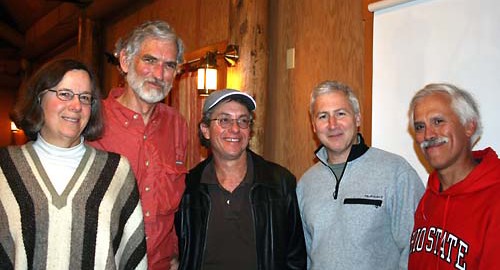Did you have to do your graduate program part time?
No, I was full time in 1982-83. I taught one more high school year in 1983-84. Then I went back to graduate school in 1985. I was done with the classes, but I wasn’t finished writing. About a year or two later I finished my thesis, and successfully defended it.
What was your thesis topic?
My thesis topic was, “A Critical Comparison of Methods for Determination of Phytoplanktonic Chlorophyll.”
It was based on Crater Lake?
Yes. It started with my work at Crater Lake. I don’t know if you saw the connection or not, but in 1978, my first year as an interpreter, Doug Larson showed up in the park. Hank and Pat asked him to do an evening program for the interpreters. It was in June, and he stood up in front of us and talked about Crater Lake. He said, “Since I’m here I am going out on the lake and if anybody would like to join me, I’d welcome your help.” It turned out I had the day off on the day he was going to work. I didn’t have to ask permission to get out of the rotation or anything. I had to ask my wife’s permission and was able to connect with him for a day on the lake.
There was a pontoon boat out there that they called the African Queen or the African Queen II. One of those boats got ripped apart in a winter storm because we didn’t get down there fast enough to take it out. We were out there in this pontoon boat doing our work and the water needed to be filtered. You could do that on the boat but Doug let me off on the island. I spent my day filtering samples with a hand pump, which is a lot of puling liquid through the filters. So my first day of limnology amounted to sitting in the boat house looking out at the lake while they were out there doing their other work, but I was happy to help.
As it turns out, I don’t know if everyone can say this, but I can say that it was the single day that changed my life. To be with this person doing research on the lake and to realize that I was very interested in not just floating around the lake but trying to understand what the lake was doing. Doug’s personality was attractive to me for some reason. He was very encouraging, respectful, and open with all the things that he was doing. Doug was really a teaching limnologist and he shared his work with the whole staff. I felt real comfortable working with him. In 1978, 79, and 80, Doug returned a couple times. I think he was even given release time as a federal employee with the Army Corps of Engineers to work in the park (14). I don’t know if the release time was a 60 -40 or 80 -20 percentage, but he spent time developing a lake program. By 1982 it looked like we were going to start a full-fledged program of research.


